By Daan de Wit
The dollar economy is being threatened by the soon to be established Iranian oil bourse, which will trade oil in euros. In addition to oil and the expansion of U.S. hegemony at the expense of future adversaries, preservation of the dollar's status has become a critical incentive for the U.S. to send out the word notifying the world of the coming war with Iran. The announcements are happening in secret, the diplomatic preparations are happening out in the open, but they are both part of the same campaign: a war against Iran.
The Dutch in the original article has been translated into English by Ben Kearney.
In addition to visits by senior officials of the CIA and the FBI to Turkey (covered earlier in this series), the commander of the Israeli army, General Dan Halutz, has also traveled  to Ankara to make Turkish officials aware of the coming war with Iran. The Associated Press reports that the talks held between Halutz and his Turkish counterpart dealt with military cooperation (such as the continuation of Operation Reliant Mermaid) and, according to the Turkish newspaper Cumhuriyet, the question of Iran as well. The question is - what stood at the top of the agenda? As indicated by Cumhuriyet, Halutz asked Ankara if his military could train in Turkey under snowy conditions in order to grow accustomed to the winter climate: 'The problem is why Israel wants to be ready for the mountain and winter circumstances? There is no cold neighboring country around Israel. The only places Israeli commandos could use their training are Turkey, Iran and Northern Iraq', reports The Journal of Turkisch Weekly. Prior to the visit by Halutz, the commander of the Turkish army traveled to Washington and the head of the Turkish air force paid a visit to Tel Aviv (soon to be followed by the head of Turkish naval forces). NATO Secretary-General Jaap de Hoop Scheffer traveled to Ankara in December of last year.
to Ankara to make Turkish officials aware of the coming war with Iran. The Associated Press reports that the talks held between Halutz and his Turkish counterpart dealt with military cooperation (such as the continuation of Operation Reliant Mermaid) and, according to the Turkish newspaper Cumhuriyet, the question of Iran as well. The question is - what stood at the top of the agenda? As indicated by Cumhuriyet, Halutz asked Ankara if his military could train in Turkey under snowy conditions in order to grow accustomed to the winter climate: 'The problem is why Israel wants to be ready for the mountain and winter circumstances? There is no cold neighboring country around Israel. The only places Israeli commandos could use their training are Turkey, Iran and Northern Iraq', reports The Journal of Turkisch Weekly. Prior to the visit by Halutz, the commander of the Turkish army traveled to Washington and the head of the Turkish air force paid a visit to Tel Aviv (soon to be followed by the head of Turkish naval forces). NATO Secretary-General Jaap de Hoop Scheffer traveled to Ankara in December of last year.
U.S. alerts the world of the coming war
Recently U.S. officials have been traveling far and wide in order to bring other countries up to speed regarding the coming war against Iran. 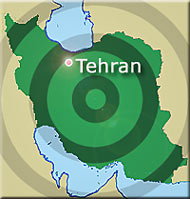 '[The German press agency] DDP also reported that the governments of Saudi Arabia, Jordan, Oman and Pakistan have been informed in recent weeks of Washington's military plans', reported Der Spiegel. 'The countries, apparently, were told that air strikes were a "possible option," but they were given no specific timeframe for the operations. In a report published on Wednesday, the Berlin daily Der Tagesspiegel also cited NATO intelligence sources claiming that Washington's western allies had been informed that the United States is currently investigating all possibilities of bringing the mullah-led regime into line, including military options. Of course, Bush has publicly stated for months that he would not take the possibility of a military strike off the table. What's new here, however, is that Washington appears to be dispatching high-level officials to prepare its allies for a possible attack rather than merely implying the possibility as it has repeatedly done during the past year.'
'[The German press agency] DDP also reported that the governments of Saudi Arabia, Jordan, Oman and Pakistan have been informed in recent weeks of Washington's military plans', reported Der Spiegel. 'The countries, apparently, were told that air strikes were a "possible option," but they were given no specific timeframe for the operations. In a report published on Wednesday, the Berlin daily Der Tagesspiegel also cited NATO intelligence sources claiming that Washington's western allies had been informed that the United States is currently investigating all possibilities of bringing the mullah-led regime into line, including military options. Of course, Bush has publicly stated for months that he would not take the possibility of a military strike off the table. What's new here, however, is that Washington appears to be dispatching high-level officials to prepare its allies for a possible attack rather than merely implying the possibility as it has repeatedly done during the past year.'
Preservation of dollar economy as incentive for attacking IranIn the previous part of this series we noted that the Iranians are preparing to launch an oil bourse in March that will trade in euros. At the same time, the U.S. Federal Reserve Bank is planning to cease with the publishing of the so-called M3 data. DeepJournal questioned financial analyst
Rob Kirby regarding his
article on this subject: 'What is the downside of the M3 data not being publicized anymore? Is it to hide the hyperinflation caused by the massive printing of dollars in reaction to the world no longer holding on to its dollars after they start to trade in PetroEuro's? And how long can you hide such a thing? Is it just a postponement of execution, as the (Dutch) saying goes?'. Kirby mailed back: 'I think you have "hit the nail right on the head" with your assessment of the situation. [...] It makes me wonder if we are today living on borrowed or bought time, compliments of a bunch of fiat worshipers who feel that "we all" lack the intellectual capacity to grasp the grand illusion being perpetrated? An uncertain world we live in indeed! [...] In response to whether or not I'm running for the hills? No, I do not plan on moving into a cave. It is my belief that things could [and likely will in the lead up to March 20,06] get geopolitically much worse. I feel that the U.S. dollar has "seen its best days" - and I feel quite certain of that.' And in that case there won't be anything left to salvage, even for a Plunge Protection Team. Read more about this team and related financial matters in this DeepJournal
article under the headline U.S. Federal Reserve made extraordinary transactions before 7/7.
Kirby goes on to write in his email: 'In the run up to March 20, I can see many countries trying to diversify their U.S. dollar reserve holdings - predominantly [at the time of writing] into Euros. I would not underestimate the Chinese - perhaps letting their currency "suddenly" float completely free to try and capture the duluge of off loaded dollars that is sure to come. This turn of events will likely send huge "shudders" through the global financial system - if it does not shake it right to the ground. I can see the U.S. dollar falling dramatically, so much so in fact, American lifestyles will likely be dramatically altered - for ever. You see, as 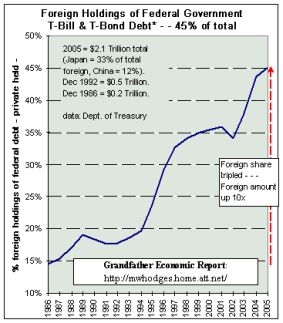 the world moves away from U.S. dollar hegemony - much of the world's oil will perhaps be priced and settled in Euros. With the U.S. having a HUGE balance of trade deficit [not to forget about their obscene fiscal deficit] with EVERYONE in the world - they categorically do not have the means to generate EUROS - or anything else that oil might be denominated in. America can only print dollars.
the world moves away from U.S. dollar hegemony - much of the world's oil will perhaps be priced and settled in Euros. With the U.S. having a HUGE balance of trade deficit [not to forget about their obscene fiscal deficit] with EVERYONE in the world - they categorically do not have the means to generate EUROS - or anything else that oil might be denominated in. America can only print dollars.
In most countries, when lifestyles are altered [for the worse], there is typically a great rise in social unrest. In many cases, throughout the world, when the type of social unrest occurs that I am contemplating - it is not unusual for civil liberties to be suspended - and dictatorship to ensue. Living in Canada - right next door to where I am certain a great deal of calamity is going to ensue - America with all that military power - is unsettling to me these days. That being said, I love my country, my family and have no plans to hide anywhere. Going forward, over the next 4-6 weeks - as this "process" picks up steam, I suppose that the 14 dollar rally in gold we saw today [Jan. 3] will give way to rallies of 20, 30, 70, 100 or perhaps more dollars in a given day - or perhaps we should just say "up" with increasing amounts of volatility. You know, I might feel "better" if we Canadians, as a country, did not have quite so much oil - and gold too for that matter. If Iran is attacked, all bets are off the table. This would perhaps make my above commentary much to rosey. You will have to use your imagination in this regard.'
Read also this DeepJournal article: Impending world-wide recession through nose-dive dollar.
Goal of West's diplomatic show: war against Iran
Tony Blair informed Parliament on Wednesday that it would be a good idea to refer Iran to the U.N. Security Council now that the U.N. seals at the nuclear facility in Natanz have been broken. Israel's military intelligence chief Aharon Zeevi Farkash upheld this point beforehand when he warned the Israeli parliament: '“if by the end of March the international community is unable to refer the Iranian issue to the United Nations security council, then we can say the international effort has run its course”'. '"Then ... we have to decide what measures to take and we obviously don't rule out any measures at all", according to Blair. The issue of whether or not Iran should be referred to the U.N. Security Council will be voted on at the beginning of February; we reported earlier that this is an important step - a formality on the road to the real goal, a military conflict. It's very well possible that Russia ends up voting in favor of a resolution condemning Iran, with China abstaining. By summoning Iran in front of the Security Council, the West will be maintaining their collision course toward an attack around March of 2006.
Javier Solana, the E.U.s high representative for foreign affairs, inspired this headline in The Telegraph: 'EU not planning military action against Iran'. Speaking earlier on behalf of NATO, De Hoop Scheffer came out against going to war with Iran. Not that it will make much of an impression on Washington: '"We 'ad hoc' our way through coalitions of the willing. That's the future," a senior State Department official said in a briefing this week that reflected Washington's search for alternatives to the post-second world war global architecture in the new era of its "war on terror"', reported the Financial Times.
Iranian leader is U.S.'s 'dream adversary'
Because of the provocative statements made by Iranian Premier Ahmadinejad, even those who oppose a new war are wondering whether or not the Iranians themselves are asking for it. 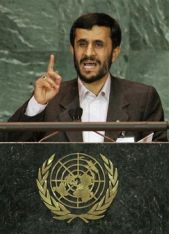 Ahmadinejad's radical persona has given the U.S. cause to regard him as a dream adversary on the order of other CIA-cultivated types such as Saddam and Bin Laden. A high-ranking German military official refers to 'the opportunity [for the U.S.] delivered by Tehran'. After the Iranian president made his statements that shocked the world, Newsweek's Michael Hirsh fittingly observed: 'Though he is rabidly anti-American, Ahmadinejad has done more to help the Great Satan than anyone since the fellow Iranian he most despises—that great toady of Washington, the Shah. [...] Ahmadinejad has handed George W. Bush a golden diplomatic opportunity. The civilized world is now united against the fiery Iranian leader.' This has also attracted attention from the hereafter, as is evident from a 'conversation' that Bush's friend Michael Ledeen (of PNAC, the Project for a New American Century), had with the late super spook James Jesus Angleton, who says that Ahmadinejad came to power with the help of intervention by the CIA. The conversation is a hypothetical one, but nevertheless demonstrates how Ahmadinejad is viewed within the circle of neoconservatives. In part five of this series we talked about how Bush was openly thanked in Iran for his indirect support in helping to elect Ahmadinejad, and why analysts found that gratitude so understandable.
Ahmadinejad's radical persona has given the U.S. cause to regard him as a dream adversary on the order of other CIA-cultivated types such as Saddam and Bin Laden. A high-ranking German military official refers to 'the opportunity [for the U.S.] delivered by Tehran'. After the Iranian president made his statements that shocked the world, Newsweek's Michael Hirsh fittingly observed: 'Though he is rabidly anti-American, Ahmadinejad has done more to help the Great Satan than anyone since the fellow Iranian he most despises—that great toady of Washington, the Shah. [...] Ahmadinejad has handed George W. Bush a golden diplomatic opportunity. The civilized world is now united against the fiery Iranian leader.' This has also attracted attention from the hereafter, as is evident from a 'conversation' that Bush's friend Michael Ledeen (of PNAC, the Project for a New American Century), had with the late super spook James Jesus Angleton, who says that Ahmadinejad came to power with the help of intervention by the CIA. The conversation is a hypothetical one, but nevertheless demonstrates how Ahmadinejad is viewed within the circle of neoconservatives. In part five of this series we talked about how Bush was openly thanked in Iran for his indirect support in helping to elect Ahmadinejad, and why analysts found that gratitude so understandable.
Ahmadinejad is the greatest gift that Bush could wish for. That is to say that Ahmadinejad is just as dangerous and just as extreme as Bush. The two are so alike in so many ways, both big and small, that investigative journalist Jim Lobe was compelled to make a side-by-side product comparison and came to the conclusion: Bush and Ahmadinejad: separated at birth?
U.S. provided Iran with nuclear blueprints
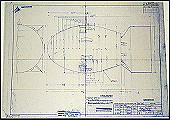 The book State of War by James Risen, recently revealed that the support provided to Iran was greater than had previously been thought (here an interview with Risen about his book on The Daily Show). In the book he states that the U.S., by way of Operation Merlin, gave Iran blueprints for an atomic weapon that included a flaw in the designs that would cause the project to fail. Experts say that the Iranians would have quickly discovered the flaw, but it never got that far because the Russian scientist who handed over the designs was a double agent, and he pointed it out to the Iranians (a flaw that he himself had originally discovered within a few minutes). The Guardian's headline: 'George Bush insists that Iran must not be allowed to develop nuclear weapons. So why, six years ago, did the CIA give the Iranians blueprints to build a bomb?'. The question pertains to whether Operation Merlin failed, or in fact succeeded.
The book State of War by James Risen, recently revealed that the support provided to Iran was greater than had previously been thought (here an interview with Risen about his book on The Daily Show). In the book he states that the U.S., by way of Operation Merlin, gave Iran blueprints for an atomic weapon that included a flaw in the designs that would cause the project to fail. Experts say that the Iranians would have quickly discovered the flaw, but it never got that far because the Russian scientist who handed over the designs was a double agent, and he pointed it out to the Iranians (a flaw that he himself had originally discovered within a few minutes). The Guardian's headline: 'George Bush insists that Iran must not be allowed to develop nuclear weapons. So why, six years ago, did the CIA give the Iranians blueprints to build a bomb?'. The question pertains to whether Operation Merlin failed, or in fact succeeded.
Sharon's coma doesn't change Israel's policy toward Iran
In addition to the nuclear threat, Israel also wants to keep the advanced air defense system Tor-M1 from being activated 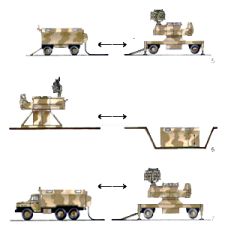 this year. The Tor-M1 is a result of a billion dollar deal between Russia and Iran. China's Xinhuanet reports: 'The official said delivery of the 30 Tor-M1 systems will begin in January [2006] and be completed by the end of next year.' '“Once the Iranians get the Tor-M1, it will make our life much more difficult,” said an Israeli air force source. “The installation of this system can be relatively quick and we can't waste time on this one"', said 'Aharon Zeevi Farkash, the Israeli military intelligence chief'.
this year. The Tor-M1 is a result of a billion dollar deal between Russia and Iran. China's Xinhuanet reports: 'The official said delivery of the 30 Tor-M1 systems will begin in January [2006] and be completed by the end of next year.' '“Once the Iranians get the Tor-M1, it will make our life much more difficult,” said an Israeli air force source. “The installation of this system can be relatively quick and we can't waste time on this one"', said 'Aharon Zeevi Farkash, the Israeli military intelligence chief'.
In the meantime Sharon lies in a coma, and the question now is - to what extent does his condition influence Israel's political stance toward Iran? Acting Prime Minister Olmert has already said that he will carry out Sharon's policy with no exceptions. And there is no reason to expect that Sharon's opponent Netanyahu would make any radical change in course. Professor James Petras wrote (before Sharon fell ill): 'Benjamin Netanyahu, leader of the Likud Party and candidate for Prime Minister, stated that if Sharon did not act against Iran, "then when I form the new Israeli government (after the March 2006 elections) we'll do what we did in the past against Saddam's reactor." In June 1981 Israel bombed the Osirak nuclear reactor in Iraq.' Thus a war against Iran will provide Israeli voters in the upcoming elections with the same type of stark choice that was available to the American electorate in the most recent presidential elections - a choice between a candidate from the secret society Skull & Bones and a candidate from the secret society Skull & Bones.

 mail this article
|
mail this article
|
 print
|
print
| 

 to Ankara to make Turkish officials aware of the coming war with Iran. The Associated Press
to Ankara to make Turkish officials aware of the coming war with Iran. The Associated Press  '[The German press agency] DDP also reported that the governments of Saudi Arabia, Jordan, Oman and Pakistan have been informed in recent weeks of Washington's military plans',
'[The German press agency] DDP also reported that the governments of Saudi Arabia, Jordan, Oman and Pakistan have been informed in recent weeks of Washington's military plans',  the world moves away from U.S. dollar hegemony - much of the world's oil will perhaps be priced and settled in Euros. With the U.S. having a HUGE balance of trade deficit [not to forget about their obscene fiscal deficit] with EVERYONE in the world - they categorically do not have the means to generate EUROS - or anything else that oil might be denominated in. America can only print dollars.
the world moves away from U.S. dollar hegemony - much of the world's oil will perhaps be priced and settled in Euros. With the U.S. having a HUGE balance of trade deficit [not to forget about their obscene fiscal deficit] with EVERYONE in the world - they categorically do not have the means to generate EUROS - or anything else that oil might be denominated in. America can only print dollars.  Ahmadinejad's radical persona has given the U.S. cause to regard him as a dream adversary on the order of other CIA-cultivated types such as
Ahmadinejad's radical persona has given the U.S. cause to regard him as a dream adversary on the order of other CIA-cultivated types such as  The
The 